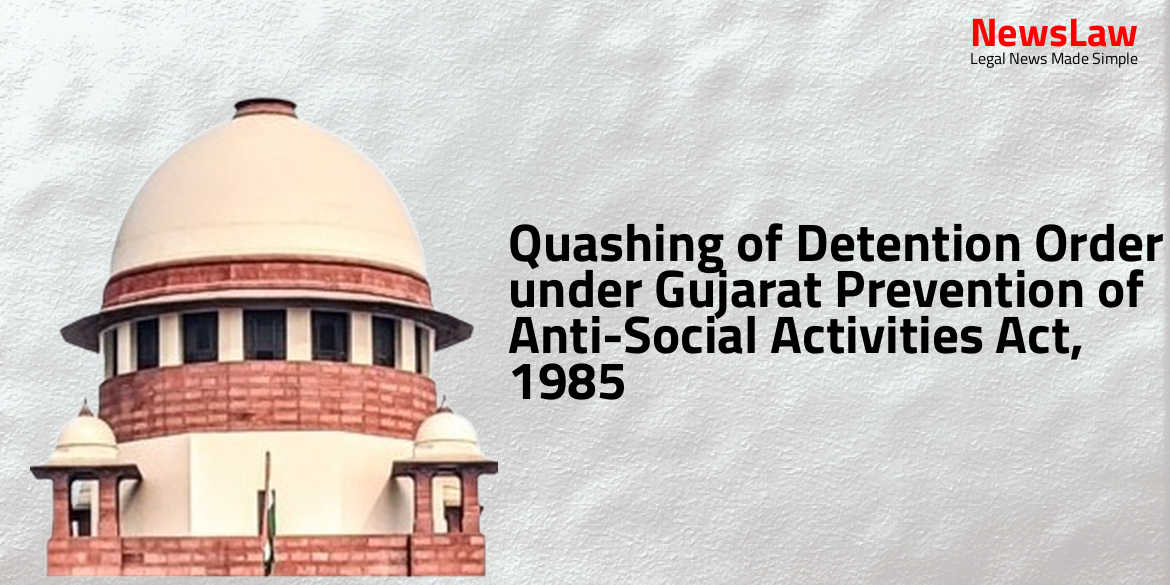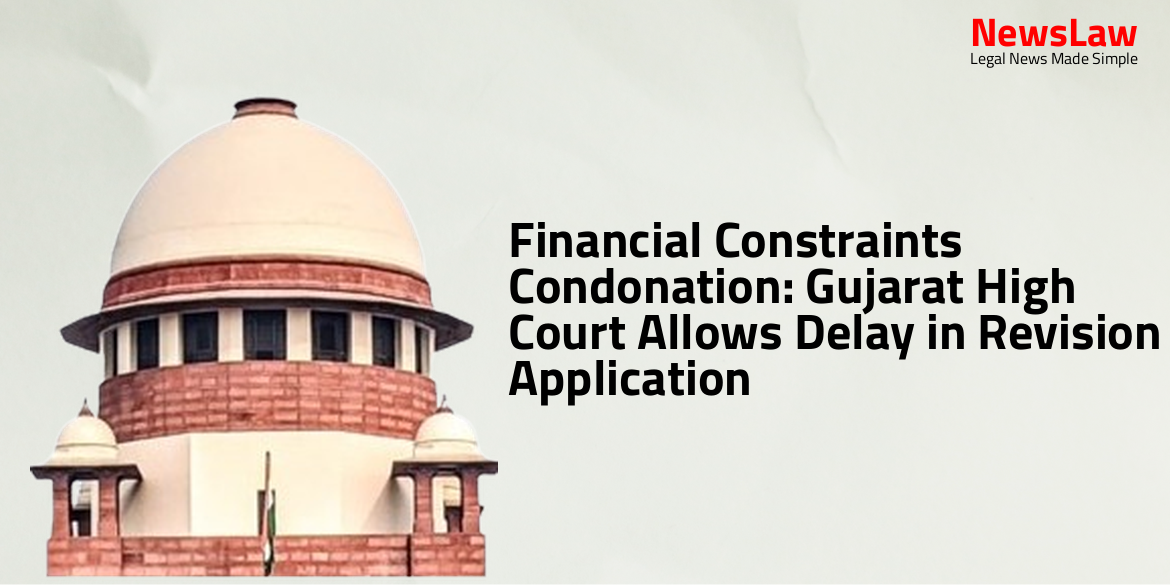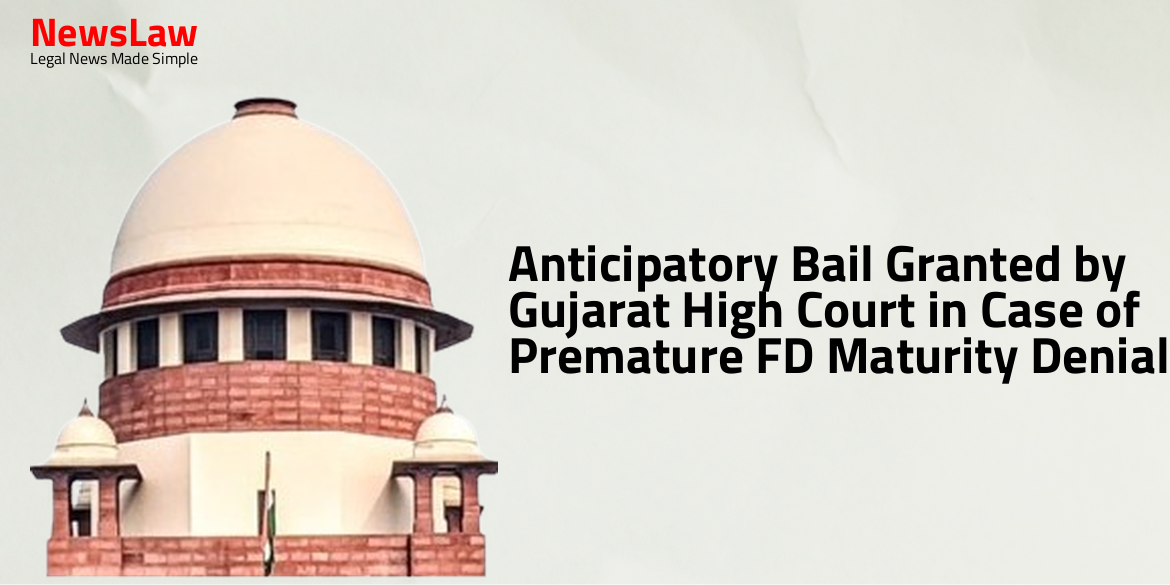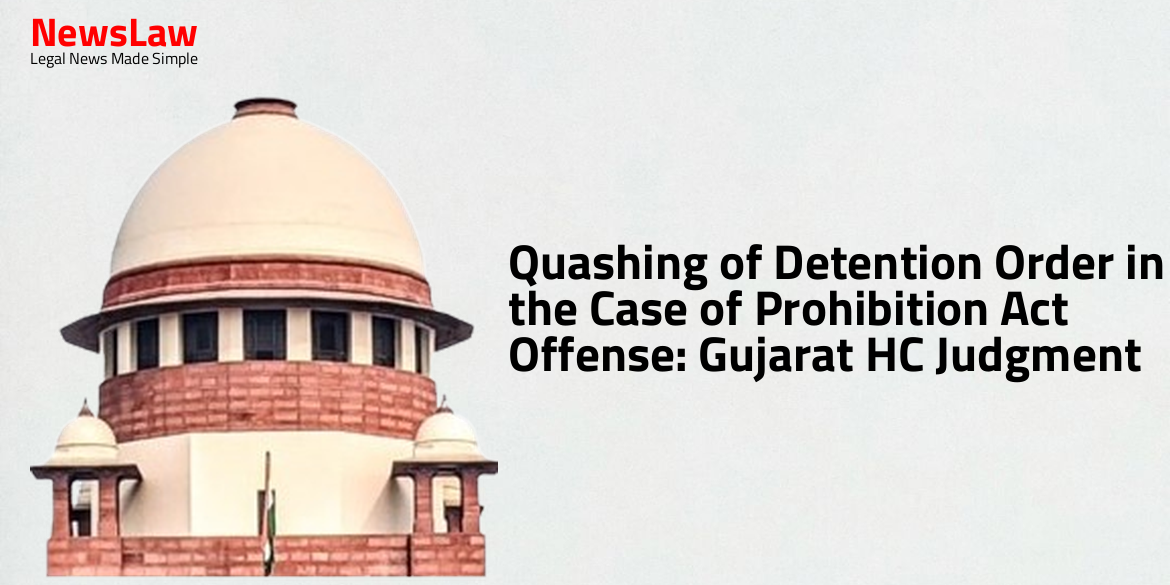Exploring the recent judgment by the Gujarat High Court regarding the detention order under the Gujarat Prevention of Anti-Social Activities Act, 1985. The court’s decision emphasizes the importance of upholding personal liberty and the proper application of preventive detention laws. Dive into the details of this significant case for insights on maintaining public order effectively.
Facts
- The petition is directed against the order of detention dated 08.01.2024 under the Gujarat Prevention of Anti-Social Activities Act, 1985.
- The detaining authority passed the order under Section 3(1) of the Act to detain the petitioner.
- The petitioner is considered as a detenue under Section 2(c) of the Act.
Arguments
- The petitioner’s advocate argues that the detaining authority solely relied on the registration of three FIRs to pass the detention order.
- The offenses mentioned in the FIRs do not have a direct nexus with public order but are more related to breach of law and order.
- There is lack of substantial evidence beyond witness statements and FIR registrations to prove the petitioner’s activities as a breach of public order.
- The advocate highlights that the criminal cases against the petitioner did not disrupt the social fabric or pose a threat to the existence of normal life.
- It is emphasized that the detaining authority did not consider the fact that the petitioner was already out on bail for all offenses.
- The State’s APP supports the detention order citing sufficient materials and evidence provided during investigation, indicating the petitioner’s habitual involvement in Section 2(c) activities.
- After reviewing the arguments and materials, the court finds that the subjective satisfaction of the detaining authority is not legally sound as the alleged offenses do not directly impact public order as required by the Act.
- There must be substantial material to prove that the individual poses a threat to society, disrupting the social apparatus and public order, which is not evident in this case.
Analysis
- A mere disturbance of law and order leading to disorder is not necessarily sufficient for action under the Defence of India Act but disturbances which subvert the public order are.
- Preventive detention cannot be used as a substitute for the ordinary law and absolve investigating authorities of their normal functions.
- Preventive detention should not be a means to keep a person in perpetual custody without trial.
- The personal liberty of an accused should not be sacrificed on the altar of preventive detention.
- Recourse to ordinary law may involve more time but should be preferred over preventive detention in most cases.
- Every act of assault or injury to specific persons does not lead to public disorder; it must affect the community at large.
- The understanding of ‘public order’ should differentiate between disturbance of law and order and disturbances affecting the community at large.
- Disturbances that affect public order must lead to public disorder.
- The State has the power to curb rights under criminal laws and preventive detention laws but must handle these with caution and proper appreciation of facts.
- Maintaining personal liberty is crucial, and detention orders should be evaluated against lawful standards.
- Constitutional safeguards are in place against the abuse of preventive detention powers.
- The exceptional powers of preventive detention must not devolve into a draconian and arbitrary exercise of state authority.
- Detention orders should be based on a proper analysis of the subjective satisfaction of the detaining authority.
- Cases involving crimes can be dealt with under ordinary criminal law, and detention on grounds of disturbing public order should be distinct.
- A breach of law affects order, but to affect public order, it must impact the community at large.
- An analysis of the distinction between ‘law and order’ and ‘public order’ is necessary to determine the threshold for preventive detention.
- Acts affecting law and order may not necessarily impact public order and vice versa.
- Serious forms of disorder directly affecting the community constitute public order disturbances warranting action under the Preventive Detention Act.
- The intimate link between maintenance of law and order and preventing public disorder should guide decisions on preventive detention.
- Authorities need to be mindful of Articles 21 and 22 of the Indian Constitution while passing detention orders.
- Ten detention orders under the Telangana Act of 1986 have been set aside by the High Court of Telangana in the past year.
- A District Magistrate can take action under Rule 30(1)(b) to prevent subversion of public order, not for maintenance of law and order.
- Preventive detention law should not be the remedy in certain circumstances.
- Law and order, public order, and security of State represent concentric circles of protection.
- The Court criticized the routine and unjustified use of Preventive Detention Law in Telangana.
- The order did not mention any State authorities filing for cancellation of bail.
- Simplicitor registration of FIR/s alone does not indicate breach of maintenance of public order.
- Section 3(1) of the Act cannot be invoked without relevant and cogent material.
- Personal liberty under Article 21 is highly valued and must be protected.
- Detaining authority must ensure strict adherence to established legal procedures.
- Article 22 is an exception to Article 21 and applies only in rare cases.
Decision
- The petitioner-detainee is ordered to be released immediately if not needed in any other case.
- The present petition has been allowed.
- The order of detention dated 08.01.2024 issued by the detaining authority is quashed and set aside.
Case Title: KARAN S/O RAJU TIRMALE (MAHAJAN) Vs. STATE OF GUJARAT
Case Number: R/SCA/3515/2024



